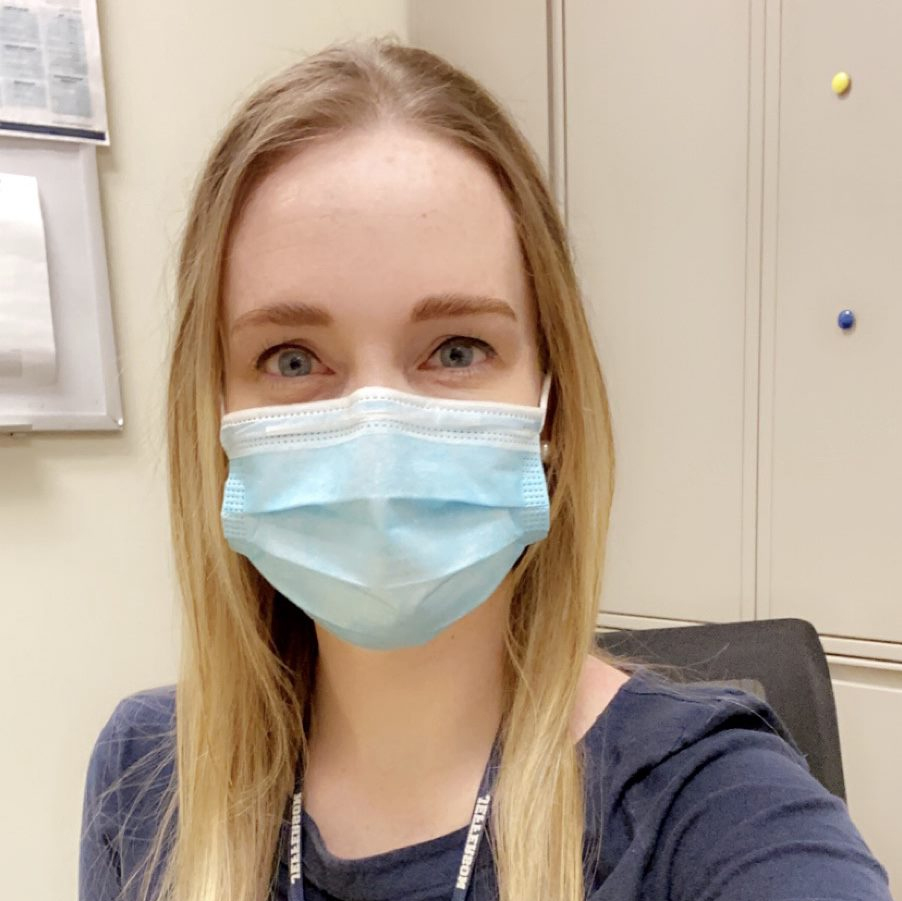
Life for clinical lab science alumna Krista McAndress ‘15, like most people, is quite different during these pandemic-filled days. But unlike most people, she is still going to work. She is a medical laboratory scientist (ASCP) at Thomas Jefferson University Hospital.
To cut down on exposure to the COVID-19 virus, she no longer takes the train into the city from her Blackwood, NJ, home. She drives. “Being in the city, it’s strange, there are way less people and only healthcare workers,” McAndress said.
Once she gets to the hospital, she is given a mask and hand sanitizer. She puts on the mask that is to be used for the entire day. It is suggested that when the mask is not being used, for instance, when she is eating, it be placed in a bag to protect it. When she leaves the hospital at the end of the day, she has the option to recycle the mask. She will be given a new one at the start of her next shift.
At Jefferson, McAndress works with the point of care testing, a hand-held lab device that is housed on patient floors. One of the most common point of care tests is the blood sugar test. This can be performed at the patient’s hospital bed and gives quick results.
In fact, McAndress had a small part in bringing the point of care device to Jefferson. “I don’t run it, but my department helped in bringing it on board and it was an awesome experience to play my part in getting that going,” she said.
Jefferson Hospital uses the Abbott ID NOW™ point of care testing. According to the Abbott website, ID NOW™ is a rapid, instrument-based, isothermal system for the qualitative detection of infectious diseases. The unique ID NOW™ isothermal nucleic acid amplification technology provides molecular results in just minutes, allowing a healthcare provider to make effective clinical decisions sooner.
And now, at Jefferson, ID NOW™ is being used to detect the COVID-19 virus through nasal swabbing.
Her department oversees all the point of care testing, making sure the devices are running accurately. They provide training to the nurses, doctors, and medical assistants and provide trouble shooting when issues arise. The department helps to distribute supplies to the seven different sites at the hospital that offer the testing.
“It’s really cool to develop these relationships with the nurses and doctors. Being behind the scenes, we usually don’t get to interact with them. We get calls when things aren’t going right, but this gives us a chance to develop better relationships throughout the hospital,” McAndress said of the point of care training and monitoring.
Of course, work at Jefferson is different now. “When I go in it’s definitely very different. I’m not a nurse or a doctor, but I can feel the change. The pandemic has affected almost every role in the hospital. It doesn’t matter how small or large the role is, and it’s an eerie feeling,” she said.
McAndress recalls at first, it was more emotionally exhausting. Every day as new information was learned, the rules for the hospital changed. Now that the rules have stabilized, “My personal role isn’t as exhausting as someone on the front line,” she explained.
A typical day now for McAndress still involves working about the same number of hours, but she’s much busier. “Although the lab at Jefferson has been involved in doing COVID-19 testing in house, I am not doing the testing itself. But it’s still cool to be part of an institution that is doing the in-house testing and that I helped in bringing the point of care device on board,” she said.
McAndress continues to walk the floors of the hospital and says there are COVID-19 positive patients on multiple floors. “Walking around the hospital, there are way less people. Riding the elevators, usually they are very crowded, now, never. It’s just the essential employees and that’s it. It’s very strange,” she said.
When she gets home from work, she washes her hands, strips off her clothes and takes a shower. “You treat every floor, every person, everything as infectious,” she said.
McAndress credits Neumann for preparing her for her role at Jefferson. “The classes at Neumann that I took were hard. Being able to develop relationships with professors and feeling comfortable to go to their office after hours, helped me succeed. And I never felt uncomfortable doing that,” she said.
She completed her internship at the Philadelphia VA Medical Center. It was there that she was first able to apply everything she learned in the textbooks into real lab work.
 CHALLENGE
CHALLENGE





